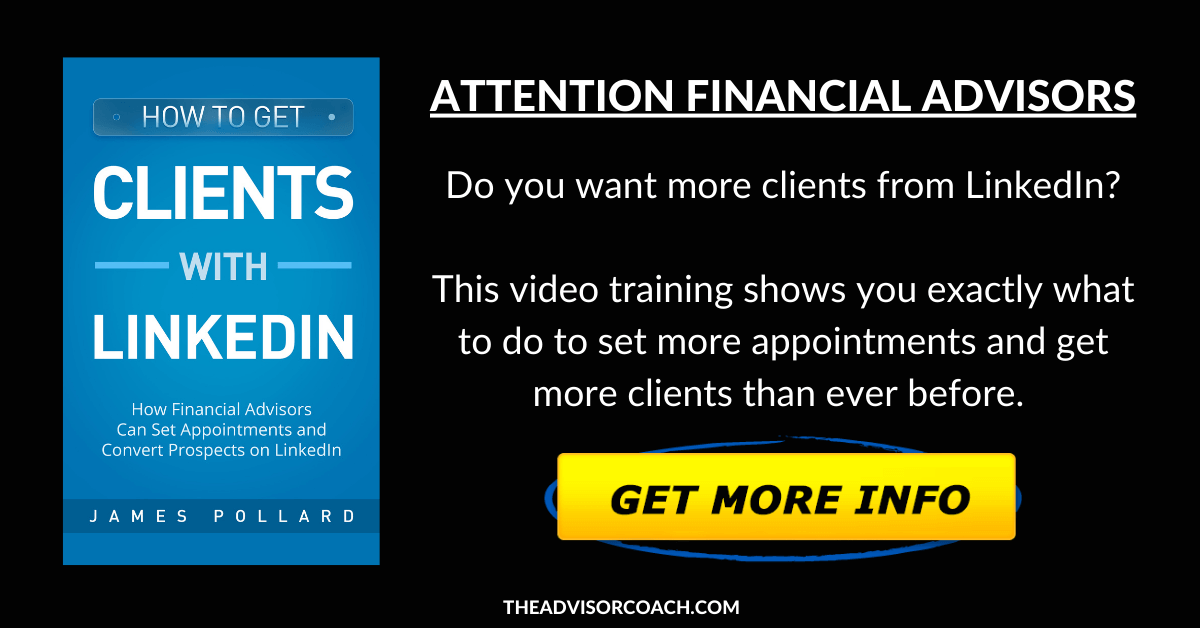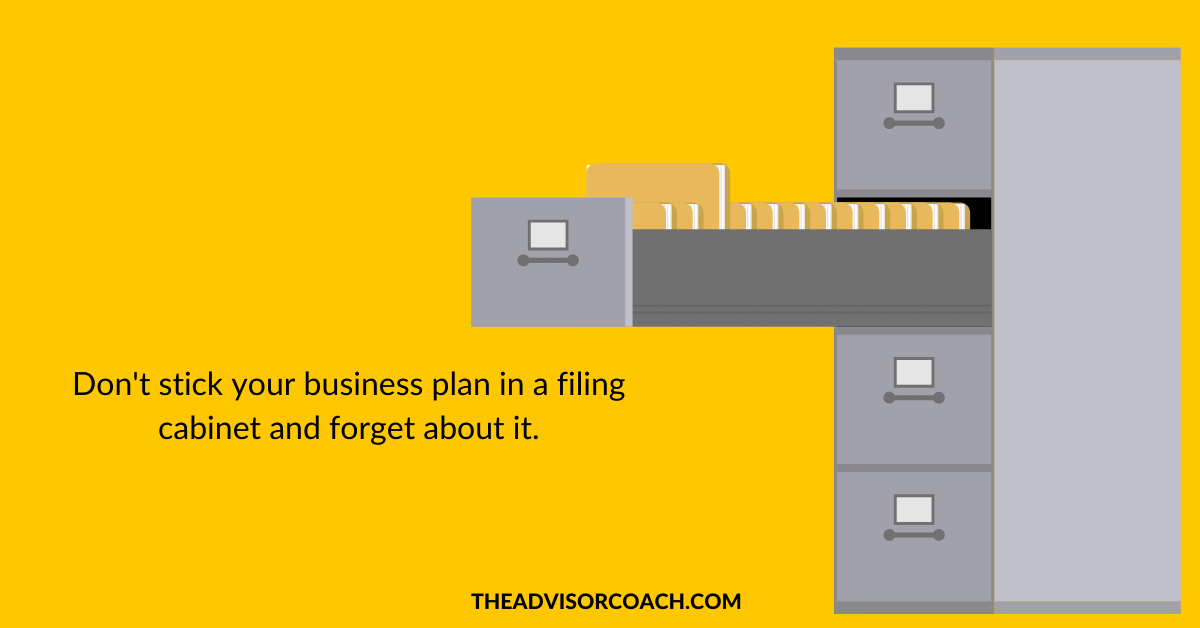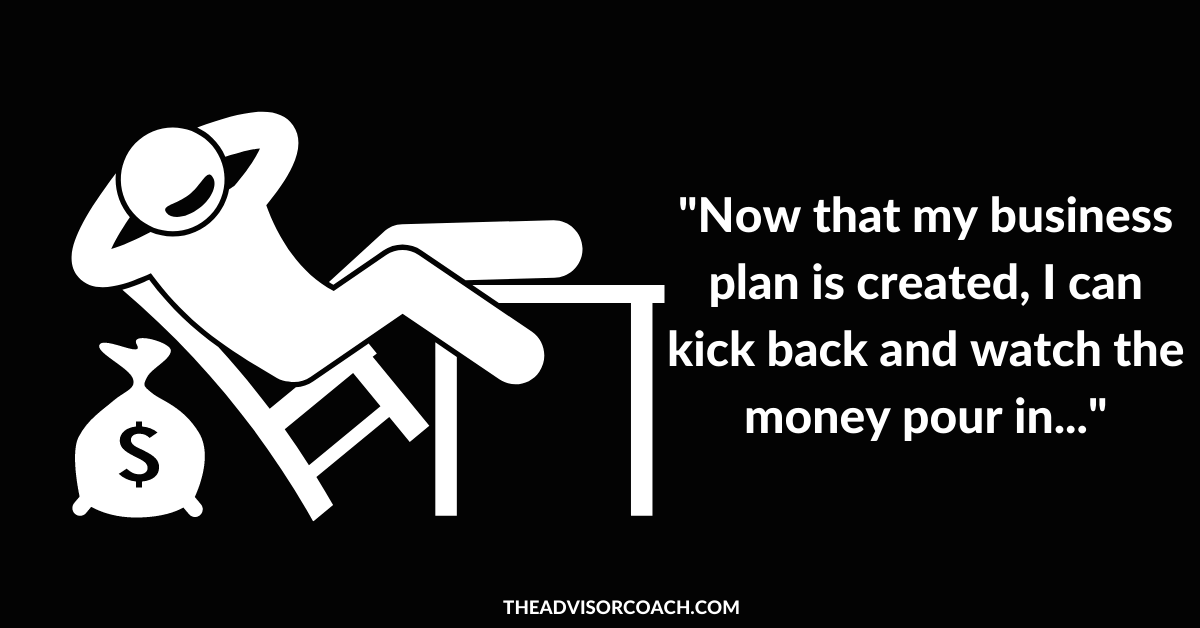9 Tips for Creating a Financial Advisor Business Plan...You probably became a financial advisor because of some deep goal that you have.
The goal to make money. The goal to help a lot of people. Maybe some other goal you have. But a goal without a plan is just a wish. That’s why it’s important for financial advisors to put together a business plan - so they know where they want to go and how they can get there. A business plan should serve as the blueprint for your business. You wouldn’t build a house without a blueprint, so why do the same with your livelihood? I'm a strong believer that when starting a financial planning business or your own financial advisory business, you should begin with a plan in mind. Here's what we'll cover:
But Do You Need a Business Plan?Honestly? No, you don’t NEED a business plan.
Even if you don’t write a plan, you still have to consider how you can seize opportunities, build a solid foundation, start marketing, etc. Every business has to start with a plan, whether it’s a mental construction or a more advanced description written out over ten pages. You don't need a fancy financial advisor business plan template or anything like that. Here are my personal thoughts on a business plan: I don’t believe that a business plan has much of an impact on a business's success but I do believe that a plan increases the chance that the creator will follow through. In a nutshell, when starting a financial advisory business, people who make a plan are more likely to get off their butt. Does that mean that the plan will be followed to the letter? No. I said that it makes people more likely to get off their butt, not execute the plan itself. I think Dwight Eisenhower said it best: “In preparing for battle I have always found that plans are useless, but planning is indispensable." A written plan forces you to evaluate multiple areas of your business at once: your value proposition, your operations, your marketing plan, and more. With that being said, here are some of my favorite financial advisor business plan tips: 1. Don't Treat The Business Plan As A Static DocumentA business plan is NOT something that you put together once and then toss aside once you finish. It is a living, breathing document that changes with you and your business.
Your business plan is not a static document. It will change over time as your business develops. It’s useful for forecasting and establishing timelines, but things change. Maybe you end up reaching your short-term goals much faster than you anticipated. Then you can go back to your plan and make your other goals even bigger. Besides, the longer your plan looks out into the future, the less reliable it will become. Longer-term plans should be more generalized instead of focusing on specific tactics. I review my own business plan once per year because I schedule projects into a yearly calendar (as explained later in the article). Doing this forces me to do a yearly check-in with myself to make sure I'm focused on tasks that will move the business forward and bring the most value to financial advisors. If I spot an opportunity that will allow me to serve financial advisors in a better way, I will adjust the business accordingly. I recommend you do the same with your business to serve your clients. :-) ALSO READ: Pros and Cons of Financial Advisor Coaching - Should Financial Advisors Hire a Coach? 2. Keep Displacement In Mind As You Create ItDisplacement is the idea that whenever you do one thing, you give up doing something else. It’s the opportunity cost that comes along with every one of life’s activities.
When you’re putting together your business plan, understand that in order to pursue a particular route, you are giving up other routes you could’ve taken. This is a powerful technique that will help you map out your most valuable business-building elements. As an example, many financial advisors get enamored with fancy (and expensive) software and tools when they start their businesses. After a few months pass, they realize they don't use these tools as often as anticipated. Unfortunately, the money is gone and the opportunity cost is real. These advisors would've been better served by recognizing opportunity cost from the very beginning and allocating their resources to a higher and better use. 3. Include A Plan For Hiring PeopleI see a lot of financial advisors get fired up about setting goals and making a plan, but when they put together their business plan, they only focus on themselves. While this is okay for a little while, eventually they will wish they mapped out a hiring process in advance.
Here’s why: most financial services professionals don’t consider bringing on an employee else until they REALLY need one. When that happens, you’re more likely to make mistakes, and they’ll cost you. In fact, a bad hire can cost many times the allocated salary. Here’s some sad news: since Gallup started tracking employee engagement in 2000, less than a third of employees report being enthusiastically involved in their work. Take out the people who were lying through their teeth and the figure is even lower. Is that cynical? Maybe. But you need to thoroughly think about how you’re going to filter out all the bad apples from the bunch. You seriously cannot afford to make a bad hire early on in your business. If you’re a financial advisor who wants to grow his/her business beyond just what you can produce, you need to look for people that can do things better than you It could be asset management, making financial plans, or market analysis. You want to focus on the things you excel at (and enjoy) and hire out the rest. I’ll save my tips on hiring/building a team for another article. And if you already have a team in place, set aside a time to discuss your business plan with them for at least a few hours. You can have them ask questions and suggest ideas, making any needed changes as you go along. 4. Understand That It Doesn't Need To Be FancyOne of the biggest mistakes financial advisors make with business plans is failing to write one in the first place. Most of the time, the business plan doesn’t get written because the advisor is intimidated by the process. He or she thinks they need a Harvard MBA to create a business plan.
This myth holds many business owners back. A business plan doesn’t have to be a full-scale plan on pretty paper packaged neatly in a binder. You could scribble some notes on the back of a napkin for all I care - a few written ideas are better than no written ideas. I do my personal business planning like this... First, I create a mind-map of all the things I would like to do in my business. Then, I make a list of those tasks and the resources it will take to complete them (people, money, time, etc.). It can take me a couple days to get all of my ideas down on paper. Once I'm finished mind mapping and clarifying my ideas, I will get a calendar template and begin plugging the tasks into my calendar. If I have a task on my list that will take two weeks to complete, I will block out two weeks on my calendar and commit the time to that task. I go through my tasks one-by-one, plugging them into the calendar until I'm finished. The items on the calendar become my non-negotiable items. When planning out my days, they're the items that MUST get finished before I work on anything else. Because I'm competitive, I compete with myself to see if I can get these tasks/projects completed ahead of schedule. If I block out two weeks, I will push myself to get in done in ten days. Then, I use the additional days to complete non-priority, "it-would-be-nice-to-do-these" type items. 5. Do Your Research FirstYour business plan is only going to be as good as the research you do for it. However, there’s a big difference between the quality of research and the quantity of research you do. Don’t get stuck doing research forever, because at some point you have to take action.
If you’re targeting a particular niche (which I highly recommend), you want to do research on their demographics, psychographics, where they hang out, etc. You want to be prepared to make educated decisions based on the research you’ve done. I've found that that the best financial advisors are very deliberate when deciding who they want to work with. They've also decided how many clients they can serve effectively and they know exactly how they're going to serve those clients. Some financial advisors have a goal of getting as many clients as possible. I think this is the wrong approach. This causes your business to become chaotic because it becomes a "volume" practice instead of a calmer, more service-oriented practice. Wouldn't you rather have four quarters instead of a hundred pennies? NOTE: Interested in using Facebook to reach your ideal prospects? Read 9 Facebook Marketing Tips for Financial Advisors 6. Be Conservative With Your Finances And ProjectionsNot long ago I opened up my coaching shortlist and, no joke, got an application from a brand new advisor who wanted to make $10 million in his first year. Not bring in $10M in assets. I mean actually take home, after taxes, ten million dollars.
I’m not the type to discourage people from big goals but this guy had never called a prospect before, had a completely empty pipeline, and was actually still in his company’s training. Needless to say, I rejected his application. When putting together a financial advisor business plan, be conservative with your finances. Write out that you’ll make less than you think and write out that you’ll spend more than you think. That way when life happens you will still be okay. However, be careful not to anchor your business plan too strongly in industry norms. For example, most financial planning firms only spend 2% or so on marketing. That's pitiful, especially when you consider that marketing should be a profit driver. Think about it: if you spent $1 in marketing and got $2 back, would you limit yourself to a self-imposed "budget"? I hope not! Don't be afraid to allocate more and more cash to marketing once you see it working. You will thank me later. 7. Review Your CompetitionWhile I definitely think you should keep your eyes on your own paper, it’s naive to completely ignore your competitors.
As a financial advisor, you’re bound to have other service providers within a few miles of where you operate. Take some time to figure out what they’re doing to market their services and build their business. Answer some of the following questions;
These are just a sampling of the questions that you want to ask as you do your competitive analysis. I always recommend identifying your top ten competitors. You don’t want this to consume too much of your time, but if you analyze fewer than ten competitors, you haven’t done a solid analysis. Another reason why you should focus on your top ten competitors is because you want to get in that space. When someone is shopping around for a financial advisor, they will seek out the top people in the space and compare them. That’s why you want to know what your competitors offer, how you can be different, and what you need to do to serve your clients better. Also, take a look at what your competition is doing wrong, so you can do the opposite. When you feel as if you’ve thoroughly examined your competition, take the information and identify some areas where you can improve. 8. Learn From Other Successful Advisors' Business PlansReach out to someone you admire and ask if he/she ever created a business plan. If the answer is yes, ask to see it. Ask some questions about the thought process behind it and how it was implemented.
One of the best things I’ve ever learned that almost all of life’s skills can be learned. When you find someone who has already had success, you would be a fool not to ask them questions and figure out how you can learn from them. Plus, once you create your business plan, you can take it back to the person and have him/her critique it. ALSO READ: How to Become a Successful Financial Advisor 9. Answer These Four QuestionsAt the heart of every successful business plan, these four questions are answered. They are:
This is business in a nutshell. All you really want to do is figure out what you want to do, who you want to do it with, how you’ll find them and why they should choose you. If you can cover those four bases, you’ll be well on your way to success. If you're still stuck, you can start by reviewing your previous year and asking yourself these questions:
The Bottom LineWhen you hear the term “business plan”, you probably think of a 20 to 40-page document, complete with graphs and pie charts and dangerously optimistic financial projections.
I think these formal plans are so popular because not only are they taught as a necessity, but because investors and strategic partners almost always require a written business plan. Because it’s so common, the business plan as we think of it is accepted as normal. Instead of one of these, you should create an informal document. Follow the above tips and create a business plan that will cut to the chase and be effective. However, make sure you implement it - don't let your business plan sit on the shelf. After all, it was legendary management consultant, Peter Drucker, who said: "Plans are only good intentions unless they immediately degenerate into hard work." P.S. If you're a financial advisor who wants to get more clients from LinkedIn, make sure you check out How to Get Clients With LinkedIn: How Financial Advisors Can Set Appointments and Convert Prospects With LinkedIn |





